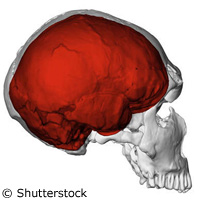Who's got the better nose? Study finds modern man does
An EU-funded team of scientists has discovered that the human temporal lobes that play key roles in the sense of smell, memory, language and social functions are relatively larger in Homo sapiens than in Neanderthals. The findings, presented in the journal Nature Communications, indicate that modern man has a better olfactory system than what Neanderthals had. The study was funded in part by the EVAN ('European virtual anthropology network') project, which clinched a Marie Curie Research Training Networks (RTN) Grant under the EU's Sixth Framework Programme (FP6) to the tune of EUR 3.3 million. Encephalisation, the brain to body mass ratio, is closely associated with human evolution. But two genetically varied evolutionary lineages generated similarly large-brained human species. Scientists from Germany, Spain and Italy investigated brain evolution in modern man by assessing shape differences in the cranial base among large-brained humans. They evaluated the anterior cranial fossae (ACF) to determine whether frontal widening in highly encephalised modern man and Neanderthals differed in shape and pattern. Markus Bastir and Antonio Rosas from the Department of Paleobiology at the Natural Science Museum (CSIC) in Spain led the team that used sophisticated medical imaging techniques to access internal structures of fossil human skulls. Three-dimensional (3D) methods to quantify the shape of the basal brain as seen in the morphology of the skeletal cranial base gave the researchers the results they wanted. 'The structures which receive olfactory input are approximately 12% larger in modern humans than in Neanderthals,' the researchers say. The team believes the results could have important implications for olfactory capacity and human behaviour. The size of human olfactory bulbs is associated with the capacity of detection and discrimination of different smells. Olfaction is one of the oldest senses in vertebrates, according to the researchers. 'Also, it is the only one that establishes a direct connection between the brain and its environment,' notes lead author Dr Bastir. Other senses must pass through different cortical filters, but olfaction goes from the environment right into the highest centres of the brain, the team notes. Says Dr Rosas: 'Olfaction never sleeps because we always breathe and perceive smells.' Olfaction's neuronal circuitry coincides with that of memory and emotion, 'which explains the enormous memory retention and vital intensity of olfaction-mediated life events'. Explaining the differences in brain development patterns between Homo sapiens and Neanderthals during a critical phase for cognitive development, co-author Philipp Gunz of the Max Planck Institute for Evolutionary Anthropology in Germany says: 'In the first year of life the brains of Neanderthals and modern humans develop differently. Modern humans have smaller faces and smaller noses than their Neanderthal cousins. However, the part of the brain that processes smells, is bigger in modern humans than in Neanderthals.' For his part, co-author Jean-Jacques Hublin of the Max Planck Institute for Evolutionary Anthropology says: 'Evidence is accumulating that Neanderthals and modern humans independently evolved large brains and that their brains might have worked differently. Our new study offers a glimpse into the functional significance of these developmental differences.'For more information, please visit:Max Planck Institute for Evolutionary Anthropology:http://www.eva.mpg.de/Nature Communications:http://www.nature.com/ncomms/index.htmlMarie Curie Actions:http://cordis.europa.eu/fp7/people/
Countries
Germany, Spain, Italy, United Kingdom



